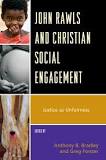
John Rawls and Christian Social Engagement: Justice as Unfairness
Edited by A. B. Bradley and G. Forster
JC251.R32 J634 2015 New Arrivals Island, 2nd floor
Recent changes in the Wisconsin State Supreme Court, the appointment of Justice Daniel Kelly, as with any justice appointment as of late, sparked conversation around the ability of a judge to set aside personal philosophies in his or her practice. Where is the line between personal philosophy and interpretation of the law? This is a question judges grapple with on a daily basis – and which those who question their judgments consistently ask. One article of Kelly’s, Rawls and Civil Society, is included in this collection which critiques the Rawlsian concept of “justice as fairness.” It is this article that was often referenced by journalists and bloggers in questioning the appointee’s political philosophy, yet often referring to the same quote or theme without fully providing the context of it. Did the commentators read the original article? Did the media consumers, thrilled or incensed by what they heard, seek context?
The place to begin is with the original source. Whether or not political philosophy is a reader’s usual fare, Kelly’s humor peppered throughout and analogies involving such things as infamous Green Bay Packer game outcomes, make this more than a palatable read.
Dig into the background. Who was John Rawls and what is his philosophy regarding fairness and justice? Search the library’s database, Reference Universe, to find a number of encyclopedias from philosophy to social theory for overview articles. Explore Rawls’ philosophy from his own point of view by using Research@UWW to find books and other articles authored by him.
Extend understanding by searching Philosopher’s Index to find other scholars’ discussions of fairness and justice, as well as critique of John Rawls, from other points of view.
Then be your own judge.
